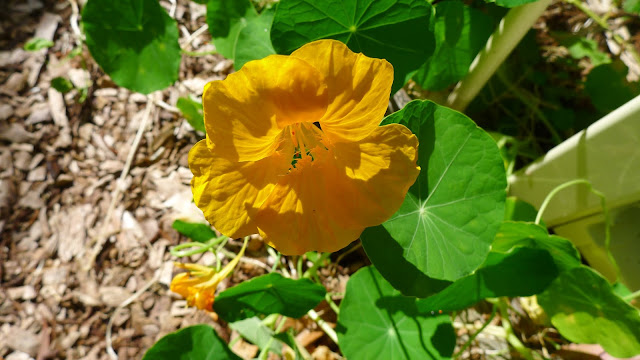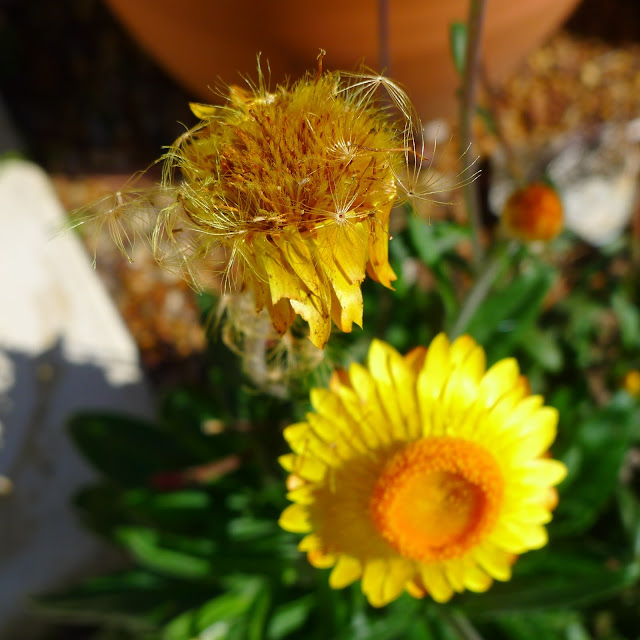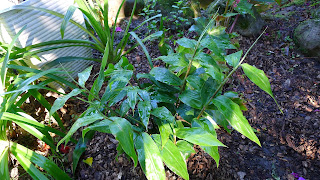Seethe much Rosemary, and bathe therein
to make thee lusty, lively,joyful, likeing and youngly.
William Langham, The garden of Health 1597
♥
♥
Mugwort Artemisia vulgaris;
If this herbe be within a house there shal no wycked spyryte abyde.
The Grete Herball, 1526
♥
Nasturtium Tropaeolum major
I sowed a seede thei brought me from Peru. More to see his fairnesse than for any medicinall vertues thst it hath. It is a flower very beautiful. which doeth adornate the gardens.
Nicholas Monardes, Joyful Newes out of the New Founde worlde, 1577
Self seeded pink Penta; favourites in the garden, easy to grow easy to keep and easily propagated from fresh cuttings.
♥
Mint
A pleasant hearb this is, and delectable to smell onto, insomuch as you shall not see a husbandmans bourd in the countrey, but all the meats from one end to the other be seasoned with Mints. If it be once set or sowne, and have taken to the ground, it will continue there a long time.
Pliny, Natural Historie, 77 AD (trans Holland 1601)
♥
Red leaves always add interest between the green plants.
Marigold Calendula officinalis
Marygoldes floures dronken, drawe downe wymens siknes and so doth the iuice of the herbe, whyche is a present remedy for the toothe ake, if the mouthe be wasshed with it. Summe use to make theyr here yelow with the floure of this herbe, not beyng content with the natural colour which god hath given them.
William Turner, A New Herball, 1551
Spring is heralded with the beautiful Rock Orchid Dendrobium speciosum. Its fragrance is dusty, different but not unpleasant.
♥
The smell of Basill is good for the heart and for the head, it taketh away sorrowfulnesse, which commeth of melancholie and maketh a man merrie and glad.
John Gerard,The Herball, 1597
♥
First Wisteria flowers;
♥
Thyme boyled in water and hony and dronken is good against a hard and painful cough and shortnesse of breath. Thyme eaten in the morning fasting and in the evening before supper is good for bleared and watering eyes and the paine in the same and it is also good for the same purpose to be often used in meates.
Thyme boyled in water and hony and dronken is good against a hard and painful cough and shortnesse of breath. Thyme eaten in the morning fasting and in the evening before supper is good for bleared and watering eyes and the paine in the same and it is also good for the same purpose to be often used in meates.
Rembert Dodoens. A Niewe Herball (trans. Lyte, 1578
Herbals available in England at this time were mainly available in Latin and French.
Henry Lyte translated the books into English, so that the common people who could read were able to use the herbal at home.
Lyte's first and most important work was his translation of the Cruydeboeck of Rembert Dodoens (Antwerp, 1564) by way of the 1577 French translation of Charles de L'Ecluse (Histoire des Plantes). His copy of the French edition endorsed on the title page "Henry Lyte taught me to speake English" is now in the British Museum. It bears numerous annotations in Latin and English in his neat handwriting, including references to the works of Matthias de Lobel and William Turner. The first edition of the translation was printed in folio at Antwerp, in order to secure the woodcuts of the original; the blocks being too heavy and valuable to transport. It has 779 pages and 870 cuts, about thirty of which are original, and is mostly in blackletter. It bears the title, A niewe Herball or Historie of Plantes. . . .
♥
Delightful Imortelles and pink Daisies, spring fragrances and colours.
Bridal Veil, Tea tree flowers swarming with butterflies and bees.
♥
Chamomile 'the appell of an eye', to comfort the braine smel to camomill, eate sage, wash measurably, sleep reasonably, delight to hear melody and singing.
Ram's Little Dodoen, 1606
Believe it or not:
That Salad is not good nor fair,
If Pimpinella is not there.
Italian Proverb
(Pimpinella =Salad Burnet Sanguisorba minor.
©Photos My Garden Ts
Herbals available in England at this time were mainly available in Latin and French.
Henry Lyte translated the books into English, so that the common people who could read were able to use the herbal at home.
Lyte's first and most important work was his translation of the Cruydeboeck of Rembert Dodoens (Antwerp, 1564) by way of the 1577 French translation of Charles de L'Ecluse (Histoire des Plantes). His copy of the French edition endorsed on the title page "Henry Lyte taught me to speake English" is now in the British Museum. It bears numerous annotations in Latin and English in his neat handwriting, including references to the works of Matthias de Lobel and William Turner. The first edition of the translation was printed in folio at Antwerp, in order to secure the woodcuts of the original; the blocks being too heavy and valuable to transport. It has 779 pages and 870 cuts, about thirty of which are original, and is mostly in blackletter. It bears the title, A niewe Herball or Historie of Plantes. . . .
♥
Delightful Imortelles and pink Daisies, spring fragrances and colours.
Bridal Veil, Tea tree flowers swarming with butterflies and bees.
Fresh green ferns, joy of spring;
♥
Chamomile 'the appell of an eye', to comfort the braine smel to camomill, eate sage, wash measurably, sleep reasonably, delight to hear melody and singing.
Ram's Little Dodoen, 1606
Believe it or not:
That Salad is not good nor fair,
If Pimpinella is not there.
Italian Proverb
(Pimpinella =Salad Burnet Sanguisorba minor.
©Photos My Garden Ts





























